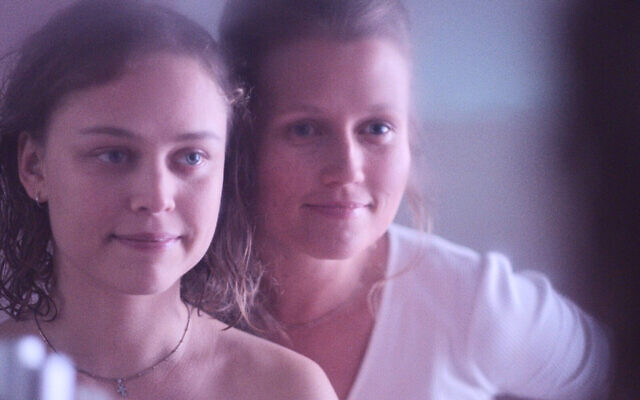BOSTON — The war in Ukraine has dominated headlines about the country for the past 13 months, but a new Israeli feature film focuses on an overlooked issue in the former Soviet republic that’s no less relevant today — mail-order brides.
directed by israeli filmmaker Michael Winick, “Valeria is Getting Married” is about two Ukrainian sisters, Kristina and Valeria. Each leaves their home country for an arranged marriage in Israel, but their respective visits have very different outcomes. Kristina is comfortably, if not passionately, married to Sabra marriage broker Michael. However, once Valeria encounters Israeli fiancé Eitan, it’s a disappointment at first sight. She locks herself in her sister’s bathroom, throws away the key, and will not come out until Eaton leaves.
“Love is as global as any other commodity today,” Winick told The Times of Israel.
“Valeria Is Getting Married” won the 2022 Ophir Award for Best Screenplay, one of its 13 nominations for Israel’s Academy Awards. It was also recognized by the Haifa International Film Festival, where it won Best Film and Best Screenplay. It screened in person at the Boston Jewish Film Festival on Sunday, March 19. The film will be viewable online, along with other selections, from March 26-29, when the festival will go virtual and international.
“I thought maybe these deals might say something profound about the relationship between the genders—perhaps between men and women, but also between women and women and women and men,” Winick said.
The film features a multi-national cast: Dasha Tavronovich, the actress who plays Valeria, is from Ukraine. Like her character in the film, she does not understand Hebrew. While shooting the film, Tovoronovich had to deal with other challenges affecting the wider world, including traveling to Israel in the early stages of the COVID-19 pandemic.
“Before vaccines, this was COVID time,” Vinick said. “Everything was very complicated. Then the war between Russia and Ukraine broke out and everything got even more complicated.
Researching mail-order brides in Israel led Winick to unconventional places. This includes visiting a Hebrew-language website advertising arranged marriages and a similar YouTube site hosted by an American man and his Ukrainian wife.

Kristina played by Lena Fraufeld and Valeria played by Dasha Tavronovich in ‘Valeria Is Getting Married’ by director Michael Winick. (Etiquette)
“It’s diversified, it’s a global thing,” she said, noting that it is less common in Israel than in the US, and that brides come from the Philippines as well as Ukraine. “It’s not illegal because it’s not really prostitution. It’s something else.
They discussed what “something else” might mean—for women who leave their home countries for uncertain prospects abroad and for men who are involved either as pimps or potential husbands.
For women, “sometimes they feel like they don’t have a choice,” Winick said. “They want to get out of the country. That’s basically the main reason.” Among men, “sometimes they are broken men,” she said. “Something about his self-esteem has really crumbled.”

Michal Vinnik, whose debut feature film, Barash, opened at nearly 60 festivals, and is showing in Israeli theaters this week, courtesy YouTube screengrab)
The film focuses on a stress-inducing day when Valeria arrives by plane in Israel. Her only contacts are her sister, brother-in-law and eventually her fiancé. There are other challenges in store. Valeria – “Lera” – does not understand Hebrew. It is expected that she will go to Alapan and formally convert to Judaism like her sister.
While the director tried to maintain a degree of empathy for all of her characters, she found that at times it required effort.
Kristina and Valeria are a study in contrasts, Winick said – “one approaches life in a more practical way,” while “the younger sister hasn’t given up on her romantic dreams yet.”
The film depicts what happens when Valeria, despite the odds against her, decides to take control of her own destiny. It’s a theme that resonates not only with the director but also with his audience.
Winick said, “Every woman I talk to understands exactly what I’m trying to say.” “For many years, the financial gap between the genders [have been] very dramatic. I know the whole idea of a financially independent woman is very new. My generation, for example—our mothers, our grandmothers didn’t get divorced, didn’t have the money to stand alone.
For the two male characters, Michael and Eaton, “I really love [Michael’s] character,” Vinick said. “I’m trying not to be judgmental. Although, of course, I don’t think anyone should be buying women or men or organs, I think for the sake of this story I had to love men too.”
It seemed a little hard for him to feel that way about Eaton. He gifts his would-be bride a Samsung phone and memorizes Russian phrases to woo her, only to be sidetracked by major events.
“He does cool things, I guess, except buy a woman,” Winick said.
He said that 90 percent of such arranged marriages do not last in real life.
“I know some arrangements that are successful,” Winick said. “There are good couples, not just bad stories. It’s still not a very ethical thing to do.
